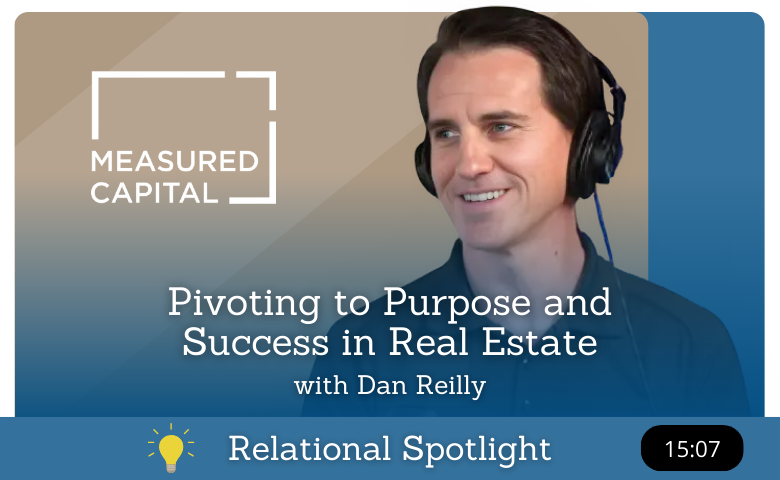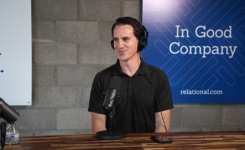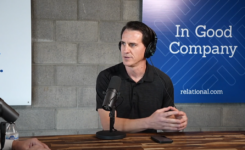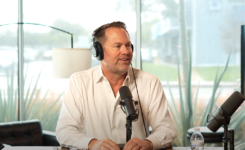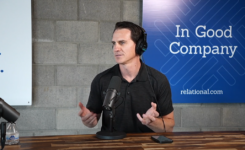Mike Rankin:
Okay. So is it a tissue moment or are we okay?
Dan Reilly:
Nah, not that vulnerable, just for me. Yeah. So three-ish years ago, I’m on the front porch of my patio with my wife Friday afternoon, sunny outside, kids are playing in the yard, and actually, right across around the corner here is the house. Typical Friday at this point in my life, we would have a glass of wine, we’d sit on the porch, and I would complain about how bad my business is and how my business life is. I had legal problems, employee problems, my partner wasn’t working out, I hadn’t hit my sales number—I was running the sales and revenue generation aspect. So it was never enough.
Mike Rankin:
Yeah, sure. Of course. “What have you done for me lately?”
Dan Reilly:
You got it. No matter how good the number was, it was never good enough. So, with a lot of love and respect, my wife, I’ll paraphrase, basically said, “Congratulations on building a profitable company. I think you’re miserable, and I don’t really like this anymore. So you have total freedom to just get rid of it.”
Mike Rankin:
Right.
Dan Reilly:
That’s awesome, right? I’m thinking, it’s worth a couple million bucks, this is my whole life, what are you talking about? “Just get rid of it, because I don’t like it anymore.” That was the hard moment. And I love you, but I don’t love you in this condition. This is not good for our family, and you’re not serving your role as a dad. So then it came down to hard conversations, and that corresponded with feedback I’d been getting for two years, like, “Hey dude, I just don’t think this is what you were meant to do with your life. You’re hanging on too tight.”
So, the other story going on the whole time was that, as I was building the business—it was a technology sales business—every time I had enough capital, I’d go buy a single-family rental home, and that built some nice passive income. And the joke was that every time I talked about real estate—you’ll see it right now—I get excited. My face lit up, right? So I had this portfolio, and I had a good team. I loved it. So, the push was: Could you be brave enough to make this your full-time deal? Could you actually transition to full-time real estate investor?
So that’s story one—that’s the hallmark of how we got here. And then the second one is Greg, my partner, the other half of Measured Capital. He was a friend of mine during this transition. I was selling the company and getting out of that, which was a pretty challenging process, obviously.
Mike Rankin:
A sticky exit?
Dan Reilly:
Very sticky, yeah. And I was looking to deploy the capital that was going to be generated into a triplex in Costa Mesa. That made sense as a natural shift up, right? To go to a larger asset. And Greg, I’ll never forget the conversation, he goes, “Dan, that’s awesome. Congratulations, your family’s going to be stoked on that. You know what I would do if I was in your position? I’d go to Texas, lock up a 100-unit deal, and figure it out.”
Mike Rankin:
What did you just say?
Dan Reilly:
Exactly! He went on for 15 minutes about how he’d do it—meet this guy, make this offer—and I thought, “That actually seems like it could work.” I read a couple of books, listened to some podcasts. A week later, I called him back and said, “We’re going to do that. Exactly that.” And so, that’s what we did.
Mike Rankin:
Congratulations.
Dan Reilly:
Yeah, I’ll tell you more about it from that point, but that is the genesis.
Mike Rankin:
Well, I can certainly empathize with you in that career transition. I had a similar situation about three and a half years ago. And yeah, those transitions are tough to navigate, especially when you’ve got a family you’re responsible for. But it’s much better to be on the other side of it, so congratulations.
Dan Reilly:
Thank you.
Mike Rankin:
So with Measured Capital then, tell me about your portfolio now. From that first deal, how has it evolved, and what are you guys doing now?
Dan Reilly:
We started on a small project in Riverside—a 17-unit—where we learned how to buy a deal, get into the operations, and discovered that small deals and tenant advocacy states are not a great business model for me.
Mike Rankin:
Exactly.
Dan Reilly:
So quickly, we were right back to that 100-unit in Texas. We found a 96-unit in Waco, Texas, partnered with a group there, and within three months realized, “This is the business model that works.” I’m leading the team, I’m seeing the numbers, all of this makes sense. And Greg and I, we’re just having fun—just straight-up fun. So, we left one of our property management calls, went out, had a strategy meeting, and said, “What can we do? We think we can raise this much money and buy something in this category.” So we set a goal: we’re going to buy 100 units in Des Moines, Iowa, or Jacksonville, Florida, and I’m not stopping until that happens. It took six months, many plane flights, a lot of offers, a lot of video offers, a lot of turn-downs, a lot of banks saying “no way.” Eventually, in December 2022, we landed our first project—108 units. That turned into 216 units. We made friends with the seller, and we’ve been off and running ever since.
Mike Rankin:
Awesome! And when you mentioned Des Moines, it reminds me—we do a lot of work with an insurance company based in Des Moines. They’re great. I was invited to a golf tournament there and told my wife, Shelly, “Well, I’ve got good news and bad news. The good news is we’ve got an all-expenses-paid trip. The bad news is…it’s to Des Moines.” It was May, and tornadoes came through and ripped up the golf tents. It was kind of nuts.
Dan Reilly:
That’s funny.
Mike Rankin:
But anyway, Des Moines! Now, what’s interesting about Texas, though, is asset prices have gone up so much. Property taxes, insurance—how do you build out a pro forma over a 5 to 10-year period and factor in potential volatility?
Dan Reilly:
Five to seven or ten years are the proper timelines. We like to underwrite everything to at least a 10-year hold and be comfortable if we have to own this asset for 10 years. In today’s environment, the most important part is having the discipline of that underwriting. If you can make a deal work today, you’re going to be really happy about it in three to five to seven years when interest rates—I have no prediction—eventually go down. We’re in the hardest insurance market of 100 years. It will soften. How much? I don’t know. So, rents are a little pressured right now. It will open up again. My point is, if we can get good assets that work and make money today, when those looser environments come back, then it really works.
Mike Rankin:
Great. So how do you compete in a saturated buyer’s market, even with all the distress factors? You’ve got private equity and Blackstone out there. How do you get the needle in the haystack?
Dan Reilly:
We’ve figured out our core competency and competitive advantage: hyper-focus on the buy box we’ve established. A lot of real estate sponsors say, “I buy apartments in the Sunbelt.” That’s broad. We say, “We buy 50-200 unit B-class garden-style communities built in the 1990s or above in Jacksonville, Florida, and Des Moines, Iowa.” If it doesn’t fit that box, don’t ask me about it. If it does, I don’t care what the story is, I want to hear about it. We’ve done that for 50-odd assets in the past few months.
Mike Rankin:
What is garden-style?
Dan Reilly:
Garden-style refers to multiple different buildings, each holding maybe four or eight units, spread out with common areas—so, like a garden or a park-like setting. Maybe there’s a lake or a pool in the middle. A lot of properties in the Sunbelt, especially in Florida, are garden-style apartments.
Mike Rankin:
Right, right. Less so in California—we’ve got to have somewhere to drain the water, probably.
Dan Reilly:
Exactly. And the alligators need a home, right?
Mike Rankin:
Exactly!
Dan Reilly:
So, the hyper-focus is huge. And then the other piece is that you have to be able to move nimbly with capital. At the end of the day, 60% of a deal is going to be financed by the bank—they’re your biggest investor. But then 30-40% has to come from at-risk equity, and it needs to roll for five to ten years. We’ve found a niche, especially locally, with business owners and high-net-worth individuals.
Mike Rankin:
And you’re raising a new fund now, right?
Dan Reilly:
Exactly. We’re doing project-level funding. So, instead of a big, open-ended fund where you raise money for five years, we identify a specific property and fund it. That way, investors know exactly what they’re buying. We do an 80-20 profit split from day one and ensure all capital is returned to the investor. We’ve talked about possibly doing a more open-ended fund for flexibility, but so far, we’ve had enough partnerships not to lose deals.
Mike Rankin:
Got it, okay, great. Love it. So, coming back full circle—how are Friday afternoons now?
Dan Reilly:
They’re so good. I’m coaching flag football on Friday afternoons. I pick the kids up from school a lot. I’m really enjoying life. What’s working is that this business can be done in project sprints, as we call them. Right now, we’re 19 days away from closing our first deal in Jacksonville, so I’m busy. But after February 21st, we’re going to Hawaii for a week. We raised the money, bought the building, and now we can take a break. In the IT business, it was 24/7—inventory was always depreciating, and you had to keep selling and collecting. Real estate, on the other hand, can be left to sit for a while, and sometimes that’s the best thing.
Mike Rankin:
Exactly. And when we last met, I think you mentioned that you cook for your family once a week?
Dan Reilly:
Yes, I do dinner. I enjoy the science of cooking. Back in my heavy entrepreneur days, we’d go five days without talking at the dinner table—kids had fast food, or we’d eat at separate times. I decided, “No, we’re going to eat the same food at 5:30 and have a conversation as a family.” If I cook once a week, that starts to happen. Now, it’s become the standard thing.
Mike Rankin:
How old are your kids?
Dan Reilly:
11 and 8.
Mike Rankin:
Ours are 24, 22, and 19. Looking back, some of the greatest moments we’ve had were just sitting around the dinner table, laughing and talking. There’s a certain type of magic about that.
Dan Reilly:
Yeah, humans were built to eat together. That sense of community is so valuable. It was one of the key motivations behind this career change, and I’m really happy that’s what our evenings look like now.
Mike Rankin:
So if someone wants to find you online, where can they go?
Dan Reilly:
MeasuredCapital.com, and you can also find me on LinkedIn as Dan Reilly. I also publish a monthly newsletter called “Ventured Learning,” which started as a way to solidify what I learn from mentors. If I write it down and teach others, it becomes operational in my life. It’s grown to a couple hundred people now.
Mike Rankin:
Can you put me on that list?
Dan Reilly:
I will! If you go to LinkedIn, there’s a link where you can sign up.
Mike Rankin:
Great, looking forward to it. Well, Dan, thank you for your time—really appreciate it.
Dan Reilly:
Thanks, Mike. Great to talk to you.


